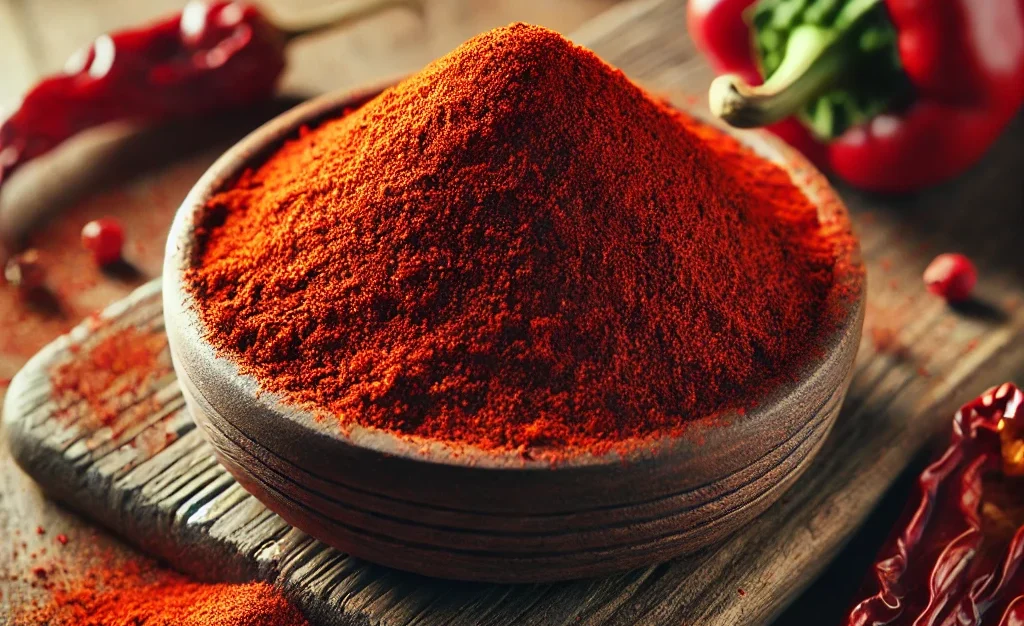Paprika, a vibrant red spice made from dried and ground peppers, is a staple in kitchens worldwide. Known for its mild to spicy flavor and deep red hue, paprika not only enhances the taste and appearance of dishes but also offers a range of health benefits. Packed with vitamins, minerals, and antioxidants, this versatile spice can support overall health, from boosting immunity to improving skin health.
Health Benefits of Paprika
Rich in Antioxidants: Paprika is packed with antioxidants such as carotenoids, including beta-carotene, lutein, and zeaxanthin, which help protect cells from damage caused by free radicals and reduce the risk of chronic diseases.
Supports Eye Health: The carotenoids lutein and zeaxanthin in paprika are particularly beneficial for eye health. They help protect against age-related macular degeneration, cataracts, and other vision-related issues.
Boosts Immunity: Paprika is rich in vitamin C, which plays a crucial role in strengthening the immune system, supporting wound healing, and maintaining healthy skin.
Promotes Healthy Skin: The vitamin C and beta-carotene in paprika contribute to healthy, glowing skin by promoting collagen production and protecting against UV damage.
Anti-Inflammatory Properties: Paprika contains capsaicin, a compound that has anti-inflammatory properties and may help alleviate pain and swelling associated with arthritis and other inflammatory conditions.
Supports Heart Health: Capsaicin in paprika may improve circulation, reduce cholesterol levels, and lower blood pressure, all of which contribute to a healthy heart.
Improves Digestion: Paprika stimulates saliva and stomach acid production, aiding in digestion and reducing bloating and indigestion.
Enhances Metabolism: Capsaicin in spicy paprika varieties can boost metabolism, promote fat burning, and support weight management.
Rich in Essential Nutrients: Paprika is a good source of vitamins A, E, and B6, as well as minerals like iron and potassium, which support overall health, including energy production, nerve function, and red blood cell formation.
May Have Cancer-Fighting Properties: Some studies suggest that the antioxidants and capsaicin in paprika may help inhibit the growth of cancer cells and reduce the risk of certain cancers.
Uses of Paprika
Seasoning: Paprika is often used to season and color dishes, including soups, stews, sauces, and marinades. It adds a mild, sweet flavor and a rich red hue.
Garnish: It can be sprinkled on top of dishes like deviled eggs, potato salads, and roasted vegetables for added color and flavor.
Spice Blends: Paprika is a key ingredient in various spice blends, such as Cajun seasoning, barbecue rubs, and Hungarian goulash.
Cooking Oils: It can be infused in oils to create flavorful dressings or drizzles for salads and roasted dishes.
Coloring Agent: Paprika is sometimes used as a natural coloring agent in food products, giving them a vibrant red color.
Safety Considerations
Allergies: While rare, some individuals may have allergies to paprika or other members of the Capsicum family (such as bell peppers and chili peppers). Discontinue use if any allergic reactions occur.
Capsaicin Sensitivity: Although paprika is generally mild, some varieties can be spicy due to capsaicin, the compound responsible for the heat in peppers. Individuals sensitive to spicy foods should choose sweet or mild paprika varieties.
Storage: Paprika should be stored in a cool, dark place in an airtight container to maintain its flavor and color. Exposure to light and heat can cause it to lose potency over time.
Interactions with Medications: Paprika may interact with certain medications, particularly those affecting blood pressure or blood sugar levels. Consult a healthcare provider if you are on medication.
Pregnancy and Nursing: While paprika is generally safe in culinary amounts, pregnant or nursing women should consult a healthcare professional before consuming large amounts of any spice.
Conclusion
Paprika is rich in vitamins A, E, and C, along with essential minerals like iron and potassium. These nutrients contribute to its health benefits, such as supporting eye health, reducing inflammation, and improving circulation. Its antioxidants help combat oxidative stress, promoting healthy aging and immune function. Paprika is also a versatile spice, used in diverse cuisines to add flavor, color, and aroma to soups, stews, meats, and even marinades. Incorporating paprika into your diet can be an easy and delicious way to boost your health.
